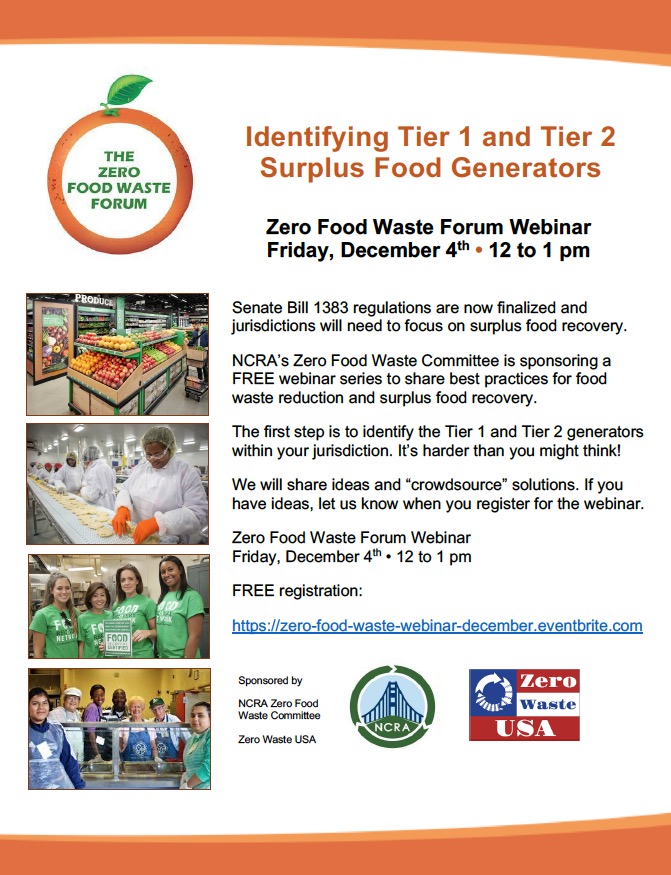Simply Voting Election Results, December 2020 for 2021 -2022 Terms
Author: Editor
Identifying Tier 1 and Tier 2 Surplus Food Generators, 12/4/20
Comments on StopWaste Guiding Principles and Recycling Plan
By David Krueger, NCRA President, 11/23/30
Thank you and StopWaste for the opportunity to provide input as you update your Guiding Principles and Recycling Plan. In general, your draft Principles and Plan align with NCRA’s mission to End Waste, our vision of a sustainable circular economy, and our goal to stop landfilling and incineration. NCRA appreciates the work that StopWaste has done in the past, and our primary comment for StopWaste is to “stay the course” and continue to implement and build upon your existing successful programs. Bringing about systemic change and transforming social norms is a slow, long-term process that requires consistent and repeated messaging and action.
Guiding Principles
NCRA is in alignment with StopWaste’s current (2018) guiding principles and the considerations for updating them that StopWaste presented at the October 15, 2020 NCRA Board Meeting: Systemic Change, Social and Racial Equity, Collaborative Partnerships, Regenerative Economy, Social Norms, Health Indicators. We strongly support your inclusion of Social and Racial Equity as a consideration. We encourage StopWaste to adopt guiding principles that look beyond a narrow “landfill diversion at any cost” framework and take into account the broader impacts of diversion efforts on communities, workers, health, climate change, and the protection of soil, water, and air quality.
Landfill Obsolescence
NCRA strongly supports StopWaste adopting a goal of landfill obsolescence by 2045. This is in complete alignment with NCRA’s mission and vision. It is a very clear and understandable goal. As noted above, this goal must be achieved in accordance with guiding principles that ensure that our efforts to achieve landfill obsolescence do not inadvertently negatively affect our communities, workers, climate, air, water, or soil.
We also recognize that this is a very audacious goal given that the previous goal of 75% diversion was not achieved. StopWaste needs to be prepared to answer questions from the public about how landfill obsolescence is achievable when 75% diversion was not. Other questions that StopWaste needs to address are: How much will it cost to achieve this goal, and how will StopWaste monitor progress towards this goal? NCRA would add that obsolete landfills can be “recycled” into locations for buy-back centers, re-use stores, resource recovery parks, composting facilities, recycling facilities, recycled content manufacturers, etc.
Stay the Course: Continue to Support Collection, Processing, and Public Education
NCRA is concerned that StopWaste may be planning to shift limited resources to new, desirable programs while prematurely discontinuing necessary existing programs that have not yet achieved their goals or full potential. One example is that StopWaste discontinued the program which provided no-cost indoor containers to businesses. That program was effective at encouraging businesses to source separate and will be even more needed as SB 1383 is implemented.
StopWaste’s draft Recycling Plan states, “both the data and the experiences of Alameda County jurisdictions and service providers suggest that the county is reaching the limits of an approach that relies on post-consumption collection and processing.” NCRA respectfully disagrees. While we wholeheartedly support waste prevention and “upstream solutions” and agree that they are preferable to “downstream” solutions, there is still much work to be done to optimize collection and processing. Contamination of collected recyclables is still at 25% – 35%. An estimated 50% of Alameda County residents don’t recycle their food scraps. Source separation is neither universally available nor understood. The public still doesn’t know how to sort properly. Significant public education, technical assistance, and enforcement efforts are still needed to ensure correct source separation and to bring about the needed change in social norms. StopWaste has successfully led these efforts in the past, and should continue to do so. Both “upstream” and “downstream” programs will be required to achieve landfill obsolescence, and StopWaste should not abandon the existing “downstream” solutions as it works to implement new “upstream” ones.
Promoting Reusables / Banning Disposables
One “upstream” solution that NCRA recommends StopWaste include in their Recycling Plan is promoting reusable foodware / banning disposable foodware. NCRA supports StopWaste creating a countywide ordinance which features funding for reusable foodware and support for enforcement. Similar to how StopWaste has successfully implemented and enforced other countywide ordinances and bans. While NCRA applauds the creativity and leadership of the individual jurisdictions who have implemented innovative, groundbreaking local resuable foodware ordinances, a unified countywide approach will be easier for the public and food vendors to understand and for hesitant jurisdictions to adopt.
SB 1383 Compliance
SB 1383 is the greatest challenge facing Alameda County jurisdictions since AB 939. StopWaste should continue and expand its efforts to support Member Agencies in achieving SB 1383 compliance. SB 1383 compliance should be a significant part of any Recycling Plan for 2021 and beyond. StopWaste has greater financial resources and staffing than most Member Agencies and is in a unique position to lead SB 1383 compliance efforts in the County. Many of the requirements of SB 1383 are most efficiently and effectively implemented on a countywide level. Examples of how StopWaste could lead SB 1383 compliance efforts include:
- Inspection and Enforcement.
StopWaste should expand its MRO inspection and enforcement activities to cover all related SB 1383 requirements. - Edible Food Recovery.
Identifying edible food generators and food rescue organizations, connecting them to one another, and educating generators are all best done on a countywide basis. Food rescue organizations do not recognize jurisdictional boundaries. - Procurement
StopWaste should coordinate the procurement of compost, mulch, renewable gas, biomass-derived electricity, and recycled content paper products by Member Agencies. StopWaste could consider organizing a purchasing co-op for some or all of these products. - Public Education.
StopWaste should continue and expand its public education and technical assistance programs in support of SB 1383. - Regional Composting Capacity
StopWaste should continue efforts to ensure sufficient composting/anaerobic digestion capacity for organics recovered in the County.
If there is insufficient funding for such efforts, StopWaste could consider asking Member Agencies if they would be willing to forgo a portion of their Measure D funding so that StopWaste could more cost-effectively implement these SB 1383 requirements on their behalf.
Thank you for soliciting and considering our comments. Please contact me if you would like to discuss them further.
# # #
Board of Directors 2020 Elections – Candidate Statements
Five members have submitted ballot statements to serve on the 2021 NCRA Board of Directors. There are five two-year positions to fill. Voting opens Tuesday, November 23, 2020, and ends Monday, December 6, 2020, at 11:59 pm.
Custom voting links will be emailed to members on November 23. If you do not receive our email but believe you should (i.e. your membership is current as of November 23, 2020), please contact the office and we will email the link again.
NCRA BOARD OF DIRECTOR CANDIDATES, 2020:
Julia Au, Member since 2018
I would be honored to serve on the NCRA Board to help our shared goals of reducing waste and making an impact in our region and beyond.
I’ve been a NCRA member since 2018, but have been involved in the waste world for over ten years from working at Californians Against Waste, to coordinating HHW programs and outreach at SF Environment and San Mateo County, where I also helped pass and enforce the County’s Bag Ban. I’m currently the Outreach and Communications Manager at RethinkWaste and a member of the NCRA DEI Committee.
If elected to the Board, I want to grow NCRA to make it more inclusive beyond the East Bay core, while also ensuring it’s a welcoming place to the diversity that the waste world in Northern California brings. This includes backgrounds, experiences, and opinions. I plan to help lead NCRA in creating additional and welcoming avenues for members to be engaged, active, and involved, while continuing to be innovative in how we do it.
We have plenty of issues to tackle for years to come, ranging from SB 1383 to social justice and climate change. I’d welcome getting to celebrate our differences while tackling the environmental issues that affect us all. I humbly ask for your vote.
 Alina Bekkerman, Incumbent, Member since 2017
Alina Bekkerman, Incumbent, Member since 2017
It has been an exceptional opportunity and an honor to serve on the NCRA board of directors for the last two years. During this time, I have taken the opportunity to collaborate on critical issues, help organize and manage events, and create programming that is both engaging and educational to our zero waste community.
During my term, I continued to serve as the liaison to the Zero Waste Youth USA, while also serving on the Members Engagement and Activities Committee and co-chairing the Diversity Equity and Inclusion Committee. I loved collaborating and spearheading numerous events, including the production for Virtual RU and am currently supporting the NRC in the production of the Zero Waste Conference, and a NCRA + ZWY Career Connection Forum.
I humbly request your support in my candidacy for another term on the board of directors of this incredible organization. Hope to continue to provide direction for the DEI committee, as we establish new priorities for our board and member organizations to focus on diversity and inclusion in the industry. I also hope to bring new and interesting opportunities for networking and connections, through more events and activities, be it virtual, or in-person once it is safe.
 Douglas Brooms, Incumbent, Member since 2013
Douglas Brooms, Incumbent, Member since 2013
I’ve served on the Board for 7 years, and I would appreciate the privilege to serve again. I look forward to Board meeting deliberations and helping with and participating in events. In pre-COVID years, I represented NCRA at each “Oakland Green Expo” and other similar events.
I’ve served as Co-chair and Chair of the Zero Waste Advocacy Committee and would like to continue doing so. I’ll continue evaluating legislative Bills, drafting support and opposition letters and collaborating with the Clean Seas Lobbing Coalition and other environmental organizations.
I will strive to further engage with these groups on the unfinished business of the 2019-2020 Legislature. Many Bills were preemptively furloughed due to COVID-19 priorities. Certain other high profile Bills appeared to have succumbed more so due to nefarious lobbying. Next year, it is my hope to persuade and engage with other organizations, to use strategies to effectuate greater accountability among legislators.
I will continue with updates to the ZWAC Webpage, and work to increase its appeal and usefulness. I’ll continue promoting awareness about the annual America Recycles Day, and other means to encourage greater recycling participation. I’m still the volunteer recycling coordinator at my apartment building.
I have sustaining commitments to climate protection and social and other environmental justice. However, Zero Waste, recycling, plastics mitigation, composting and food recovery advocacy are my stronger passions, still making NCRA my favorite place. I would appreciate your vote.
 David Hott, Member since 2019
David Hott, Member since 2019
As a newly certified Practitioner in Zero Waste Principles and Practices, I offer an energetic viewpoint that can enhance collaboration efforts towards Zero Waste. I began my journey into reducing GHG by being part of the beginnings of the A La Carte Program of Loaves & Fishes, which was created by my close friend Doctor Nancy Fishman the founder of Forgotten Harvest. Since the inception of the A LA Carte program, we have achieved the following results:
In FY2020, A La Carte provided 336,147 meals and reduced greenhouse gas emissions by 420 metric tons. With our partners’ continued support and the Hot Meals provided by our cooking staff since March 2020, A La Carte has distributed 301,827 meals and reduced greenhouse gas emissions by 374 metric tons to date.
My entry into the efforts towards Zero Waste began with a new chapter in my professional development. After many experiences and exciting opportunities within the private sector, I decided to go back to school and pursue an education focused on Human Services. It is there where I recognized my real passion; to be of service to others.
The responsibility I have in becoming a larger part of the solutions for climate change influences my decision to become an active member of NCRA. I would be humbled and extremely honored to become a member of the Board of Directors of this wonderful organization.
 Jessica Jane Robinson, Incumbent, Member since 2013
Jessica Jane Robinson, Incumbent, Member since 2013
I have served as Vice President for two years and Treasurer for four years. As Vice President, I have exposed NCRA to other demographics and markets. I spoke at the United Nations and represented NCRA as Vice President, along with my other titles. NCRA was a sponsor for Earth Day SF 2019 when my superhero alias, Resilience, was the event’s face and emcee. NCRA’s logo was on my superhero Earth Day SF poster that was on Muni buses, and recycle guides distributed throughout SFUSD and to the public for the promotion of the event. ABC Channel 7 interviewed me as NCRA Vice President about recycling and waste diversion in the Bay Area. As Treasurer, I helped organize NCRA’s finances and got caught up with past filing taxes. I have helped NCRA’s exposure to other demographics through various forms of media. I advised NCRA to become the first sponsor of Girls Inc of the Island City’s Ethical Fashion Show, an annual event produced by youth.
I am on a brand new NCRA committee for CA schools. I look forward to contributing to NCRA and the school committee in new ways as my career expands with new opportunities unfolding. I hope to be selected to serve another term for the NCRA board.
# # #
Post-Mortem Of SB 54/AB 1080 And Others
By Doug Brooms, NCRA Board Member and Chair of the Zero Waste Advocacy Committee, NCRA News, October 23, 2020
In the early days of September, much had been written and explanations offered in the aftermath of both SB 54 and AB 1080, gasping and dying in fleeting days and hours on the floor of the California Legislature. As such, a post-mortem is defined as “an examination of a dead body to determine the cause of death”. Naysayers made spurious claims, it was Bad Policy. Backers lamented, if only we had more time, if we could have persuaded just a few more legislators, if…. How many have noticed or smelled the Elephant in the room?
SB 54 and AB 1080 Post Mortems
For the second consecutive year, both AB 1080 and SB 54, the identical Circular Economy and Plastic Pollution Reduction Acts, failed to emerge from the California State Legislature. The redirection of State funds for Covid-19 relief and priorities could have been influential this year. However, for both 2019 and 2020, the problem appeared more so in the Assembly, to gain enough Aye votes for a 41 vote majority to pass. Below are the vote tallies for both 2019 and 2020, for both Bills, and in both houses, taken from the Legislature Bill Search link: http://leginfo.legislature.ca.gov/faces/home.xhtml.
In 2019, SB 54 had passed out of the Senate on 5/29 by 28-8-2, and subsequently was sent to the Assembly where it failed on 9/06, by 38-16-25 (Ayes-Noes-NVR).
In 2019, AB 1080 had passed the Assembly Floor on 5/30 by 44-19-17, and presumably was sent to the Senate, but never came up for a vote by 9/01.
In 2020, SB 54 did not come up for a vote in the Senate (having already passed in 2019?). However SB 54 failed in the Assembly on 8/31 by 37-18-24.
In 2020, AB 1080 had passed the Senate on Sunday 8/30 by 23-12-5, but was never sent to the Assembly with amendments to allow for any vote by 8/31 midnight.
It is noteworthy that when SB 54 was up for a vote at the end of the year for 2019 and 2020, a significant number in the Assembly had chosen to not be recorded for a vote, and were listed as NVR (No Vote Recorded), 25 in 2019 and 24 in 2020. Of these, there were 14 (names underlined) who were listed as NVR for both 2019 and 2020. Of the 14 total, 13 were Democrats and 1 (Waldron) was Republican (in italics). The vote results below were also assembled from the CA Legislature:
In 2019, SB 54 in Assembly, NVR: 22 Democrats, 3 Republicans, 25 Total
Aguiar-Curry, Arambula, Bloom, Burke, Calderon, Cervantes, Cooper, Daly, Diep, Eggman, Gipson, Grayson, Irwin, Limón, Low, Maienschein, Melendez, Petrie-Norris, Quirk-Silva, Ramos, Rodriguez, Blanca Rubio, Salas, Smith, Waldron
In 2020, SB 54 in Assembly, NVR: 18 Dems, 5 Republicans, 1 Independent, 24 Total
Aguiar-Curry, Arambula, Brough, Burke, Cervantes, Cunningham, Daly, Diep, Eggman, Frazier, Gallagher, Cristina Garcia, Eduardo Garcia, Gipson, Grayson, Holden, Irwin, Low, Mayes (I), Petrie-Norris, Quirk, Rodriguez, Voepel, Waldron
It is also noteworthy that on 8/28/20, the attached 54-1080 Coalition New Opposition Floor Alert apparently was circulated, which simply stated: “Vote No on AB 1080 and SB 54” (Available is a “MS Word” version). The two pages listed the logos and names of 87 organizations, seeming as an implied ultimatum. Among them were “presumably” campaign contributors, familiar to state legislators. The timing for the release of the Floor Alert on the last Friday appeared to be strategic, as it left little time for supporters to react with any counter campaign before the Monday midnight deadline.
Was such a Floor Alert also used in 2019? Was it the intention to forewarn legislators that their recorded vote would matter during funding of their next election campaign cycle? Being on record with an AYE vote would be disqualifying for them, whereas a NO vote would be upsetting to their constituents. So it should be safer to abstain from a vote, which would effectively serve the same purpose of avoiding an AYE for their potential contributors.
Had the unfavorable outcomes for SB 54 been predestined, with enough Noes and NVRs already pocketed, prior to the Assembly Floor votes? The fate of SB 54 had been nearly identical in both 2019 and 2020. It leads to speculation that maybe the fix already had been in place. In the case of AB 1080, which had just passed the Senate on 8/28/20, what reportedly remained was for the Senate Pro Tem to return the Bill to the Assembly Floor for a vote, before midnight 8/31. However curiously that was not done. Again, could this outcome likewise have been baked into the cake, so to speak? If anyone has a more accurate accounting, please do share. 66 signatories, 66 signatories,
What can be said of the so called “Moderate Democrats”, or better “Industry Compliant Democrats” who chose the “safe” NVR option? Perhaps there are more descriptive monikers, maybe such as NVR = Not Very Reliable, at least to their constituents. But to their lobbyists, maybe NVR = Nearly Valuable Republican. Choose or make up your own, and make them wear it.
California Legislators Report Card
As a side note, the Sierra Club California annually scores the performance of legislators on environmental issues. For 2019, 34 Assembly Members and 9 Senators earned 100% scores.
The assembly members who earned perfect scores on the 2019 Legislative Report Card are:
Rebecca Bauer-Kahan (Assembly District 16), Marc Berman (AD 24), Richard Bloom (AD 50), Rob Bonta (AD 18), Ian Calderon (AD 57), Wendy Carrillo (AD 51), Sabrina Cervantes (AD 60), Ed Chau (AD 49), David Chiu (AD 17), Kansen Chu (AD 25), Jesse Gabriel (AD 45), Cristina Garcia (AD 58), Todd Gloria (AD 78), Lorena Gonzalez (AD 80), Chris Holden (AD 41), Reggie Jones-Sawyer (AD 59), Ash Kalra (AD 27), Sydney Kamlager-Dove (AD 54), Marc Levine (AD 10), Monique Limón (AD 37), Evan Low (AD 28), Kevin Mullin (AD 22), Al Muratsuchi (AD 66), Bill Quirk (AD 20), Anthony Rendon (AD 63), Eloise Gómez Reyes (AD 47), Luz Rivas (AD 39), Miguel Santiago (AD 53), Christy Smith (AD 38), Mark Stone (AD 29), Phil Ting (AD 19), Shirley Weber (AD 79), Buffy Wicks (AD 15) and Jim Wood (AD 2).
Is there any expectation that two-time NVR Democrats Cervantes and Low will score 100% for 2020?
SB 246 and AB 345 Post Mortems
SB 246 (Wieckowski) Oil and Gas Severance Tax, would have brought California in line with all other 34 major oil producing states in the nation, by imposing a 10% oil and gas severance tax. SB 246 would have raised approximately $900 million per year for the general fund. See a sample support letter. In 2019, the two-year Bill had garnered the support of at least 37 grassroots non profit organizations. However on January 8, 2020, an opposition SB 246 Coalition Letter with a long list of 66 signatories, including customary campaign contributors, had been submitted to Senator Wieckowski. The copy distribution included Chair Senator Mike McGuire, Vice-Chair, and Members of the Senate Governance & Finance Committee, where the Bill resided.
Curiously, the 1/15/20 hearing on SB 246 was postponed, and removed from the agenda, effectively killing the Bill for failure to advance out of the Governance & Finance Committee before the 1/31/20 deadline. SB 246 had been the latest in a long series of failed attempts to pass a state severance tax. In all, at least 7 bills have been introduced in both the Senate and Assembly since 1990. And in 2006, a ballot measure was put to the voters to establish a tax on oil and gas being extracted in California, but was defeated after opponents spent almost $100 million in opposition. During the 2017-2018 legislative session, Western States Petroleum Association and Chevron had spent nearly $16 million and $14 million respectively, persuading legislators to vote their way.
AB 345 (Muratsuchi) would have created health and safety buffer zones, up to 2,500 feet, between communities and oil extraction activities. In 2019, Lorena Gonzalez, chair of the Assembly Appropriations Committee, had tabled AB 345 until the 2020 Session. Near the end of the 2019 legislative session, Gonzalez had received campaign contributions from among Chevron, ExxonMobil, and Western States Petroleum Association, totaling at least $16,100.
By 2020, AB 345 had garnered the support of over 270 environmental, labor, racial justice, public health, and faith organizations, as well as 79% of Californians, according to a then recent poll. However the Bill was defeated in the Senate Committee on Natural Resources and Water, in a 5-4 vote on 8/05. Democratic Senators Hertzberg, Hueso and Caballero joined two Republicans to oppose the bill. Senators Hertzberg and Hueso had each received $28,100 and $21,500 respectively in campaign contributions from companies that lobbied against AB 345. Hueso also has behested at least $81,000 from the fossil fuel industry throughout his political career. Senator Anna Caballero has received $15,000 from the oil and gas industry.
“The lobbying and influence campaign efforts waged by the oil industry and labor against AB 345 illustrates the difficulty in crafting climate policy and environmental protections, even in a state with a supermajority Democratic Party legislature that bills itself as a global leader on fighting climate change. A big part of the difficulty is the contradiction at the center of it all: California is the sixth biggest oil producer nationwide and the largest West Coast oil refiner.”
“Big Oil’s tentacles extend far and wide in California politics. Lobbying is just one of the methods that Big Oil uses in California to exercise inordinate influence over California regulators. Western States Petroleum Association and Big Oil wield their power in 6 major ways: through (1) lobbying; (2) campaign spending; (3) serving on and putting shills on regulatory panels; (4) creating Astroturf groups: (5) working in collaboration with media; and (6) contributing to non profit organizations.” CA Regulators Issue 6 New Fracking Permits As Record Fires And A Pandemic Continue. Dan Bacher, Daily Kos, 10/12/20 […]
Looking back through the legislature graveyard, what other recent or past Bills have been dispatched by unbridled Lobby spending and tacit persuasion? Yes, California is one of 15 trifecta states with a majority Democratic legislature and governorship. Given that Democrats traditionally are far more amenable to environmental concerns, and Republicans are staunchly pro business, how can these anomalies keep happening?
For insights about this, see this passage below from the Feb. 2020 article Brace for the Deluge: Special interests are Spending Millions to Get the California Legislators They Want. […]
Picking the right “brand” of Democrat
In the most heated (and expensive) battles for California legislative seats, the key question for big outside spenders isn’t whether to back a Republican or a Democrat — but which kind of Democrat.
It’s a reflection of the Democratic Party’s dominance of state politics in California. For businesses that might have once prioritized the election of Republicans, backing a business-inclined Democrat is now often their best bet for ensuring a friendly vote in Sacramento.
“The goal is to get your particular brand of Democrat to emerge in the run off,” said David Townsend, who directs the Californians for Jobs and a Strong Economy, a committee that backs moderate Democrats. In races where business interests and organized labor pick different candidates, he said, “it’s an arms race. When one side spends more, you have to spend more.”
Which candidates have been propped up or targeted the most by independent expenditure groups?
The next info graphics show which legislators receive the most and the least financial support from business.
Money and Politics
In her email of 9/01/20 “CA Legislature Results”, Kathryn Phillips, Director with Sierra Club California, concluded with:
“Now the bad news: Only a handful of priority bills even got as far as the floor of the opposite house, and then only some of those passed. This year, when it was essential because of COVID that we work virtually and so couldn’t physically be present in the Capitol to remind legislators what their constituents who vote want and expect, the power of the moneyed special interests was more obvious than ever.
The lesson for me is that elections matter and elected officials need to be held accountable–including in non-election years. We’re about to launch an accountability project. So watch this space.”
Her closing statement has given rise to a number of questions and possibilities. Would such an Accountability Project amount to simply calling out the Democrats who were swayed by lobbyists, or finding more principled candidates to challenge them in the California March 2022 Primaries? If one or both 54/1080 type Bills will be reintroduced in 2021, what else can be done to avoid a repeat scenario, most likely in the Assembly? Would an accountability project be inclusive of a greater comprehensive multifaceted game plan? Foremost, how pervasive is the perceived corruption of money in CA Legislature politics? What other important Bills have been stymied, going back for how long?
If either or both SB 246 and AB 345 had passed, a net effect could have been the slowing or curbing of oil production, at least in California. The plastics industry has long enjoyed an unfair competitive advantage of artificially suppressed oil prices, given the decades of federal subsidies, and the State absence of a severance tax. Unless and until the cost of recycled plastic feedstock falls below the cost of virgin oil, there exists little if any incentive to reprocess into pellets, and to incorporate into the manufacture of new plastic products.
The Next Round – 2021?
What lies ahead for 2021? For the Plastics War, SB 54 and AB 1080 had seen rather fierce battles in California, which “Big Plastic” regards as the essential beachhead. However, with battalions of lobbyists with limitless cash ammunition and proven tactics, they have managed to hold ground in 2019 and 2020. In an analogous military sense, our two Generals, authors Ben Allen and Lorena Gonzalez and their staffs of officers and soldiers, may have been left battle weary. The amount of everyone’s time, sacrifices and distractions from other important obligations must have been inordinate.
There has been scuttlebutt that either or both are disgusted with the entrenched colleagues, and perhaps not up for another round. Would that forebode that the war is finished for now? It seemingly should be a travesty to retreat and to give up the hard fought gains made during the two years. Regardless, commendations are in order for those who fought the Right Fight, and our gratitude will endure.
Perhaps there is resignation to instead leave Recology’s California Recycling and Plastic Pollution Reduction Act ballot initiative for the November 2022 elections, to take up the fight. However, if history can provide any lesson or insights, it had been Big Oil which had defeated every attempt to pass an oil severance tax in the California legislature since 1990. In 2006, when a ballot initiative was attempted instead, Big Oil had spent nearly $100 million to insure its defeat, amazingly convincing people to vote against their own best interests.
There would be nothing more gratifying to the opponents of plastics reform, than for supporters to be seen as having given up, and accepting defeat. An unintended consequence would be to reinforce and affirm the opposition’s tactics as proven successful, to be used confidently whenever needed again. Another casualty could become the ultimate captivity of the California Legislature itself. When more principled legislators witness other colleagues cashing in big on the Pay-to-Play NVR scheme without any consequences, wouldn’t that increasingly fuel the temptation to also jump in?
Most anyone who has viewed the 52-minutes PBS documentary Plastics War is likely of the resolve that defeat is simply not an option. Just as insightful and disturbing is the rather lengthy 2019 article Waste Only How the Plastics Industry Is Fighting to Keep Polluting the World. There is far too much at stake, for the preservation of our lands, the oceans and marine life, our increasing ingestion of micro-plastics and our own well being, and of the planet for generations.
Most anyone who has viewed the 52-minute PBS Frontline documentary Plastics War is likely to resolve that defeat is simply not an option. Just as insightful and disturbing is the rather lengthy July 2019 The Intercept article Waste Only: How the Plastics Industry Is Fighting to Keep Polluting the World by Sharon Lerner. There is far too much at stake, for the preservation of our lands, the oceans and marine life, our increasing ingestion of micro-plastics and our own well being, and of the planet for generations.
Imagine if another dual pronged 54/1080 type set of 2-year Bills were to be launched in January? What might become the outcome this time? Big Plastic’s playbook and tactics have been exposed. Regardless, a new $6 billion Chevron Phillips Chemical plastics factory has been built along the Texas Gulf Coast. Expect that Big Plastic will spare no expense to undermine any laws and regulations which would threaten to curb their anticipated explosion of single use plastics on America and the world. Again, conglomerates can wield their formidable power in 6 major ways: through (1) lobbying; (2) campaign spending; (3) serving on and putting shills on regulatory panels; (4) creating Astroturf groups: (5) working in collaboration with media; and (6) contributing to non profit organizations.” Also, expect brutal misinformation campaigns.
The point is that if there should become a similar 54/1080 undertaking in 2021, then nothing should be left to chance. Beyond hopeful thinking, required would be an early and well planned, broad based, comprehensive strategy, for the long term, including some of the following:
-
-
- During the remainder of 2020, supporters of 54/1080 could reach out to leaders of other failed Bills, including such as Oil Bills, SB 246 and AB 345, to find common cause, to create broader coalitions. “You support us and we will support you”.
- Develop parallel and common game plans and timelines. Share what various organizations have learned from mistakes and how to avoid repeats.
- What contemplation and brainstorming might be done to devise new and better strategies and tactics for the next time around?
- Looking back, at which committee did each prior Bill encounter difficulties or obstructions, and by whom? After the Nov. 3 elections, which previous obstinate committee chairpersons or members would likely still be in place?
- What strategies of persuasion and dissuasion could be conceived of to minimize risks of 2021 Bills being preemptively tabled until 2022? Will the path of successive committees and rules be the same?
- For the Oil Bills, it should be wise to continually seek expanding the numbers of legislators to take or recommit to the “No Fossil Fuel Money” pledge. See the attached list of California candidates and legislators through May 2020
- A “No Big Plastics Money” pledge for politicians could not be found. What would it take to devise and roll out one, at least initially for California Legislators?
- What incentives might be considered towards reaffirming and securing the support of Bills from among incumbents and new legislators?
- What amicable approaches could be considered to reclaim particularly those 13 Democratic Assembly Members who had gotten away with the NVR ruse for the past two consecutive years, and might have the audacity to try for a third time?
- Alternatively, perhaps a tough-love letter could be devised: Dear Member, Below is a list including you and 13 of your colleagues who chose to abstain (NVR) from voting on SB 54 in August of 2019 and again in 2020. Included are the campaign contribution totals that each received from various Plastics industry opponents, suggesting potential conflicts of interest. In the event that our 2021 Bill does not pass, our coalition members will endeavor to unseat incumbents who had not been supportive, with alternative candidates for the March 2022 California Primaries.”
- A likewise letter could be crafted for the attention of problematic Senators.
- Could there be any possibilities of further refinement of social media tools to deploy with such speed, scope and magnitude, as to rival the overwhelming money advantages of Big Plastic? Imagine the impact of reaching every corner of a problem incumbent’s district with messaging, if necessary, or at least the threat, akin to a nuclear option?
- Could there be any avenues for dissuading the customary business allies from ongoing support of Big Plastic, maybe a novel business case
- What effective remedies have other states implemented towards getting their proposed legislation passed? According to the National Caucus of Environmental Legislation (NCEL) and their 2020 Plastic Pollution Legislation Master Sheet, the State of New York has introduced 32 pieces of legislation, compared to 6 in California. Is there anything to be learned how they deal with legislators and lobbyists to get their Bills through?
-
Much else needs to be planned – now, if intentions are to hit the ground running in 2021.
Thank you your indulgence. Corrections are welcome. Share with others as desired. Use any or all as you wish, and as your own for credibility.
Remember, “It always seems impossible, until it’s done” – N. Mandella

